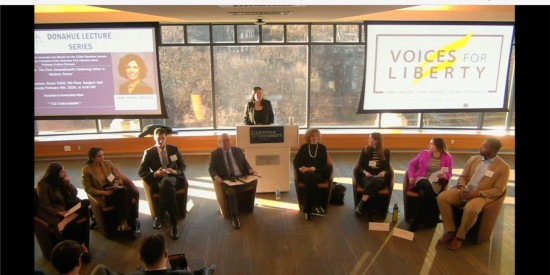
Video screenshot: Program speaker Prof. Nadine Strossen is seated immediately to the right of the podium, with DY on the left. Suffolk U. Law Review editor-in-chief Sara Levien is at the podium, opening the program. We are joined by a panel of Suffolk law students.
Earlier this month, I had the distinct pleasure of moderating a program on freedom of speech and expression, featuring Professor Nadine Strossen (Emerita, New York Law School), former President of the American Civil Liberties Union. The program was part of the Donahue Lecture Series sponsored by the Suffolk University Law Review. As a faculty co-advisor to the Law Review, I was delighted to be a part of this event.
In planning the program, Professor Strossen, an internationally recognized authority on free speech, suggested that we cast aside the typical lecture format and create a more interactive conversation. So we started with an interview that I conducted, followed by questions from a panel of Suffolk law students, and concluding with questions and comments from our audience.
The event was a tremendous success. Before an overflow room of attendees, and sparked by Prof. Strossen’s thoughtful, insightful, and engaged remarks and responses, as well as great questions from our student panelists, the program made for a lively 75-minute exchange. You can watch the full event by clicking here.
Prof. Strossen offered passionate defenses of free speech, while carefully dissecting the legal implications of speech and expression in various public sector and private sector settings. You can read a brief summary of some of her major points here. And if you’d like a very informative and accessible primer on speech protections in the U.S., then I happily recommend her 2023 book, Free Speech: What Everyone Needs to Know (Oxford U. Press).
But wait, there’s another big thing to consider!
I have long been in general agreement with Nadine Strossen’s embrace of freedom of speech. And especially during times like this, safeguarding free speech — subject to reasonable restrictions such as prohibiting defamation, fraud, or targeted harassment and abuse — is of paramount importance toward maintaining an open, democratic society.
In addition to protecting the sanctity of free speech, we all should learn and practice how to converse and listen more constructively. Whether one regards speech as a right or privilege, we have an obligation to exercise it responsibly.
By this, I’m not suggesting the adoption of intrusive speech codes. Nor should we jump all over something that isn’t said in just the right way, in just the right tone. Furthermore, there are instances where righteous anger may be a proper, or at least very understandable, response to deeply offensive or hurtful speech.
Rather, I mean coaching ourselves, and encouraging others, to engage in conversations on sensitive and difficult topics with as much respect and empathy as we can muster.
In addition, exercising self-restraint (which I do not necessarily equate with self-censorship) may be appropriate at times. After all, just because we’re allowed to say something a certain way doesn’t mean we should always do so.
Equally important, we should actively listen to what others have to say, and at least try to understand points of view that may seem opposite of our own. With that kind of listening, we see possibilities for genuine exchange, discovery of unexpected common ground, and perhaps even changing one’s understanding of, or position on, an important issue.
By the way, I fully confess that I have not always followed the precepts I am preaching. Everything I’m suggesting here is easier said than done.
Back to our Donahue Lecture
I was so pleased that the Donahue Lecture was an exemplar of engaging and respectful conversation about difficult and important topics. The event also meant a lot to me personally, as many moons ago, Prof. Strossen was my supervising professor in the Civil Rights Clinic at NYU School of Law, her first academic appointment before moving on to become a constitutional law professor at the New York Law School. Her warmth, intelligence, and student-centered focus were evident then and now, and I was proud to be able to show off our wonderful students at Suffolk Law.
Prior to the event, several student editors of the Law Review shared with me their understandable concern that someone might try to use this occasion to stage a protest in support of their views on some controversial public issue. After all, we’ve seen news accounts of such disruptions at other universities, at times requiring an event to be discontinued in midstream. But I assured them I was confident that, between the professionalism of our guest speaker, our students, and other attendees, I was not concerned about such a possibility.
This was no statement of false bravado. As I planned how to moderate the event, I did consider potential responses should a situation threaten to get out of hand. But I wasn’t girding myself for anything uncomfortable to arise. I had faith that our event would be an example of healthy and informed dialogue. I was so happy that it more than met my expectations.
